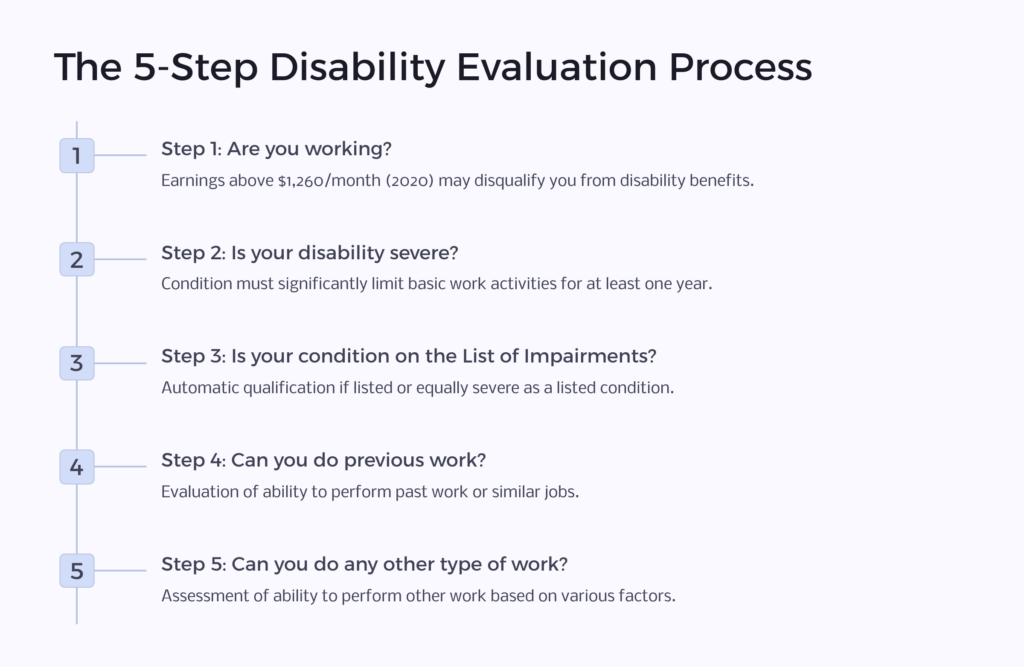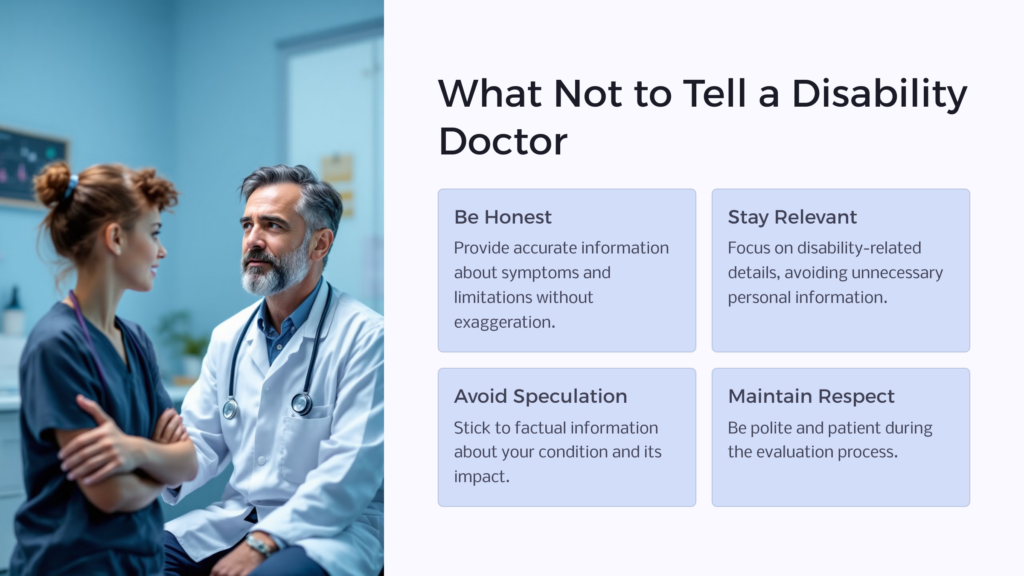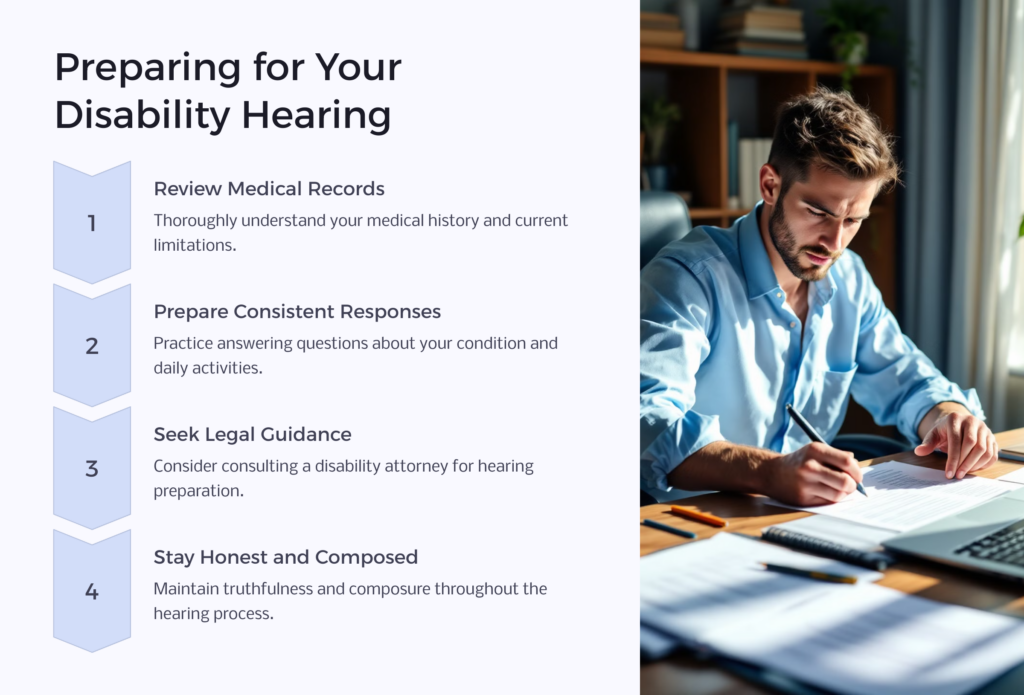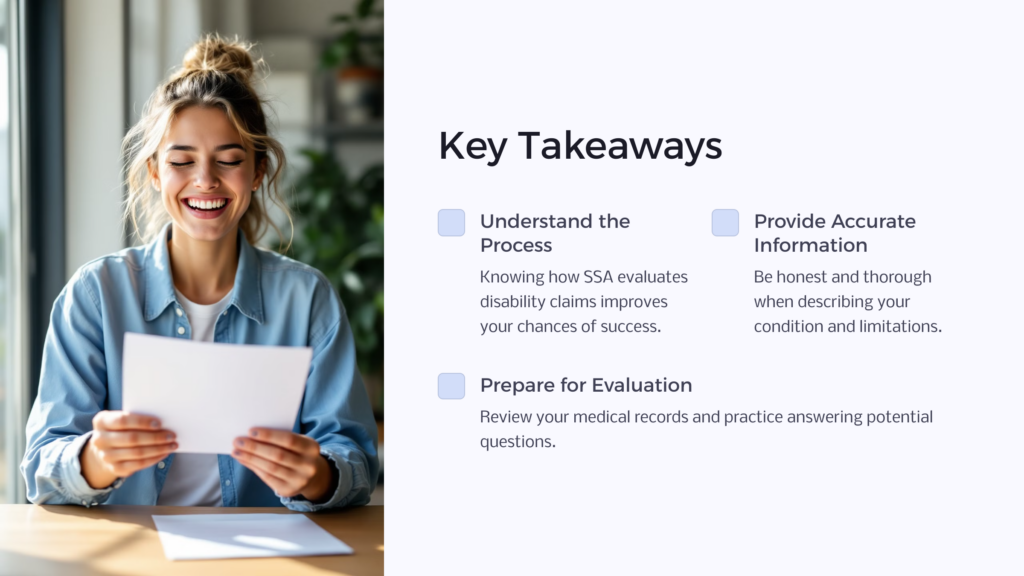Who decides if I am disabled? If both my doctor and the Social Security disability doctors say I am unable to work, will I be approved?
Claims examiners in consultation with a physician decide whether you are disabled according to Social Security Disability rules. These employees of the Disability Determining Services called DDS for short, make the disability decision because they are trained in Social Security law and regulations including Social Security’s specific definition of disability. Neither your own doctors nor a doctor you might see in a consultative examination (whom some people call “Social Security disability doctors”) make the decision. If your claim has progressed to a hearing appeal, the administrative law judge (ALJ) who hears your case makes the decision.
What About Your Doctor’s Opinion?
The claims examiner and DDS doctor consider all the information from your attending physicians. However, to be accepted as valid evidence for your claim, your doctor’s assessments must be supported by clinical observations, test results, or other supporting medical evidence. In other words, your doctor has to explain how he arrived at his diagnosis and his assessment of your capabilities and limitations.
Consultative Examiner’s Opinion
When Social Security hires a doctor to examine you, the claims examiner instructs the doctor to evaluate whether you have the illness or injury that you claim and to identify any limitations and restrictions you may have. The doctor is not asked to make a disability decision and when the consulting doctor’s report is received, the DDS examiner reviews the report to be sure that the conclusions the doctor has drawn from the examination are supported by clinical observations or testing cited in the report.
5-Step Disability Evaluation Under Social Security

The Social Security Administration uses a basic 5-step process to determine eligibility for disability benefits:
Step 1: Are you working?
If your disability allows you to work, and you’re able to earn more than a certain amount per month then (usually) the SSA does not consider you to be disabled. The earnings limit in 2020 for non-blind persons is $1,260/month; for the blind, $2,100. This amount is adjusted each year. Your countable earnings for evaluating your work activity as related to whether or not you are disabled can be reduced by Impairment-Related Work Expenses (IRWE’s) including but not limited to medications that you take.
Step 2: Is your disability severe?
If your average earned income per month does not exceed the limit, then the SSA passes your application along to the Disability Determination Services (DDS) office in your state. For the DDS medical examiners to determine that, indeed, you are disabled; your medical condition must significantly limit your ability to do basic work activities—such as walking, sitting, and remembering—for at least one year. If your disability is not that severe, they will decide that you are not eligible for SSD benefits.
Step 3: Is your medical condition on the List of Impairments (LOI)?
The DDS refers to the LOI to see if your condition is listed. If it is, then it automatically means that you are disabled as defined by law. If it isn’t, then the DDS looks to see if your condition is as severe as a condition that is on the list.
Step 4: Can you do the work you did before?
The DDS decides if your medical condition prevents you from being able to do the work you did before. (Or something similar.) If you can still do it, they will decide that you are not disabled.
Step 5: Can you do any other type of work?
The DDS looks to see if you could do some other type of work, despite your disability. It evaluates your age, education, medical condition (physical or mental), work experience, and any skills you may have that could be used to do some other work. If you cannot, they will determine that you are disabled. But if you can do other work (even if you don’t care to), then you are deemed not disabled and, therefore, ineligible for SSD benefits.
What Not to Tell a Disability Doctor

When attending a disability evaluation, knowing what information to disclose and what to avoid is important. This section addresses the top Google FAQs regarding what not to tell a disability doctor, offering insights to help applicants navigate the evaluation process effectively.
FAQ 1: Should I withhold any information from the disability doctor?
Honesty is paramount during a disability evaluation. Provide a clear and accurate account of your symptoms, limitations, and the impact they have on your daily activities and work. Avoid exaggerating or minimizing your condition, as this can undermine the credibility of your claim. A truthful representation of your abilities ensures an accurate assessment of your disability and increases the chances of a successful application.
While it’s essential to provide honest and accurate information during a disability evaluation, it’s prudent to avoid volunteering unnecessary personal details unrelated to your condition. Stick to discussing the symptoms, limitations, and the impact of your disability on daily activities and work. Unrelated personal issues or unrelated medical history may not be relevant to the evaluation and could potentially dilute the focus on your current disability.
FAQ 2: Can statements made during the evaluation affect my disability claim?
Yes, statements made during the disability evaluation can significantly impact your claim. It’s crucial to be mindful of the information you provide to the doctor, as it can influence their assessment of your disability and functional limitations. Avoid downplaying or minimizing symptoms, as this can lead to an inaccurate representation of your condition. Be thorough and specific in describing your limitations to ensure an accurate evaluation of your disability.
FAQ 3: Are there any specific details I should avoid mentioning to the disability doctor?
While honesty is essential, certain details may not be relevant to the disability evaluation and can potentially hinder your claim. Avoid discussing non-medical opinions or providing excessive personal information unrelated to your disability. Additionally, refrain from making assumptions about your condition or using speculative language. Stick to factual information about your symptoms, their frequency, duration, and the impact they have on your ability to perform daily activities and work.
FAQ 4: Should I mention if I’ve ignored doctor’s orders in the past?:
While it’s crucial to be honest, it’s generally advisable not to volunteer information about past non-compliant behavior. Focusing on your current condition and its impact is more relevant to the evaluation. Discussing past non-compliance may raise concerns about your willingness to follow medical advice and could potentially weaken your case. Instead, emphasize your commitment to managing your condition and complying with the recommended treatments and therapies.
Navigating a disability evaluation requires careful consideration of what information to disclose to the doctor. By adhering to these guidelines and focusing on relevant disability-related details, applicants can enhance the accuracy and effectiveness of their evaluation.
FAQ 5: How should I approach interactions with the disability doctor?
Maintaining a respectful and polite demeanor is essential during the evaluation. Avoid being rude, impolite, or impatient, as this can create unnecessary tension and negatively affect the evaluation process. If you find establishing a productive rapport with the doctor challenging, consider seeking another qualified professional for a second opinion. It’s crucial to feel comfortable and confident in the doctor’s ability to understand your condition and provide a fair evaluation.
Disability Judge Trick Questions to Watch Out For
1. Good Days: “Do you have any good days?”
The judge might inquire about your “good days” to assess your disability’s severity. It’s essential to be honest about your condition’s fluctuations, but don’t be tempted to downplay the overall impact of your disability. Emphasize how even your good days still involve challenges.
2. Unrelated Activities: “Do you engage in any hobbies or activities?”
This question identifies any perceived inconsistencies between your daily activities and disability claims. Be truthful about your hobbies, but also clarify how they are significantly limited by your disability and the assistance you require.
3. Memory Test: “Can you recall what you had for breakfast yesterday?”
The judge might inquire about specific details or events to test your memory. Stay composed and answer to the best of your ability. If you have memory issues, honestly express how your disability affects your recollection.
4. Medication: “Are you taking your prescribed medications regularly?”
Answer honestly about your medication routine, but also describe any side effects or adverse reactions you may experience. This will demonstrate that you know about your treatment and its impact on your daily life.
5. Timeframe: “Since when have you been disabled?”
Be prepared to provide a clear timeline of when your disability started affecting your ability to work or perform daily activities. If your condition has worsened over time, explain the progression and how it has hindered your functionality.
6. Work History: “Tell me about your previous jobs.”
Be honest about your past work experiences, but highlight how your disability gradually made it more challenging to continue working. Mention any accommodations you received or tried to maintain employment.
7. Pain Threshold: “On a scale of 1 to 10, how would you rate your pain?”
When describing your pain level, be specific and consistent throughout the hearing. Explain how it impacts your ability to perform tasks and any adjustments you need to make.
8. Social Media: “Are you active on social media?”
The judge might inquire about your social media activity to find inconsistencies in your disability claims. Be honest about your social media presence, but also explain how posts or photos may not accurately represent your daily life with a disability.
9. Housework: “Do you do any housework or chores?”
This question is designed to assess your physical capabilities and limitations. Be truthful about your ability to perform household tasks, but also emphasize any difficulties you face or assistance you require to complete them.
10. Reliability: “Can your friends or family confirm your disability’s severity?”
The judge might ask about statements from friends or family regarding your condition. While it’s helpful to have support from loved ones, remember that their understanding of your disability might not be comprehensive. Focus on providing your own account and medical evidence to support your claims.
11. Unemployment: “Have you been actively looking for a job?”
Be prepared for questions regarding your efforts to find employment. If your disability prevents you from working, explain the challenges you’ve faced while job hunting due to your condition.
12. Future Employment: “Do you think you can work in the future?”
The judge may gauge your long-term employment outlook. Be cautious with your response and focus on the present impact of your disability, emphasizing the difficulties you face in sustaining regular employment.
13. Activity Level: “How do you spend your typical day?”
The judge may ask about your daily routine to understand your activity level. Be truthful about your activities, but also describe how your disability limits your ability to engage in certain tasks or how you need to pace yourself.
14. Pain Management: “Are you seeking alternative treatments for your pain?”
Be honest about any alternative treatments you’ve explored, but also explain why you may not have pursued them further. Emphasize your compliance with prescribed medical treatments and any limitations they impose.

Remember to remain consistent, composed, and honest during the disability hearing. Remember, the key to navigating these trick questions is honesty and consistency. Prepare for your disability hearing by thoroughly reviewing your medical records and understanding your limitations. If possible, seek guidance from a disability attorney or advocate, who can help you anticipate these questions and respond effectively. Staying alert and confident during the hearing increases the likelihood of receiving the disability benefits you deserve.
Submit Your Claim
If you have a very severe illness or injury listed in the Social Security’s Listings and you submit records to document your diagnosis and the severity of your condition, you may be approved at Step Four of the disability evaluation process. If you don’t meet the Listings, you have another opportunity to be approved for benefits. At that point, Step Five in the evaluation, information about your work history and education become very important.
You are more likely to be successful with your Social Security claim if you know how the Social Security Administration evaluates for disability. With that knowledge, you will recognize the information you need to provide to support your claim.

 Benefits.com Advisors
Benefits.com Advisors
With expertise spanning local, state, and federal benefit programs, our team is dedicated to guiding individuals towards the perfect program tailored to their unique circumstances.
Rise to the top with Peak Benefits!
Join our Peak Benefits Newsletter for the latest news, resources, and offers on all things government benefits.



















